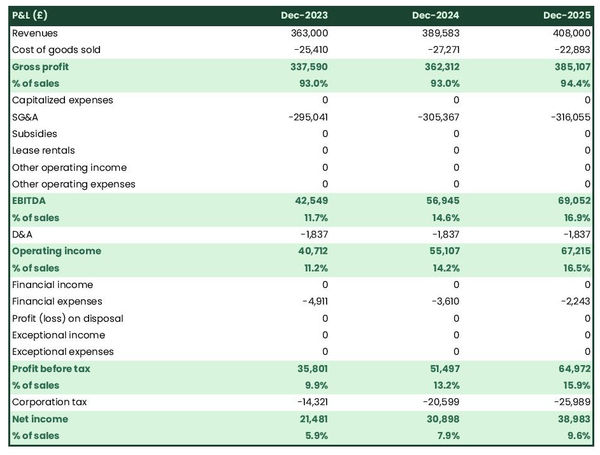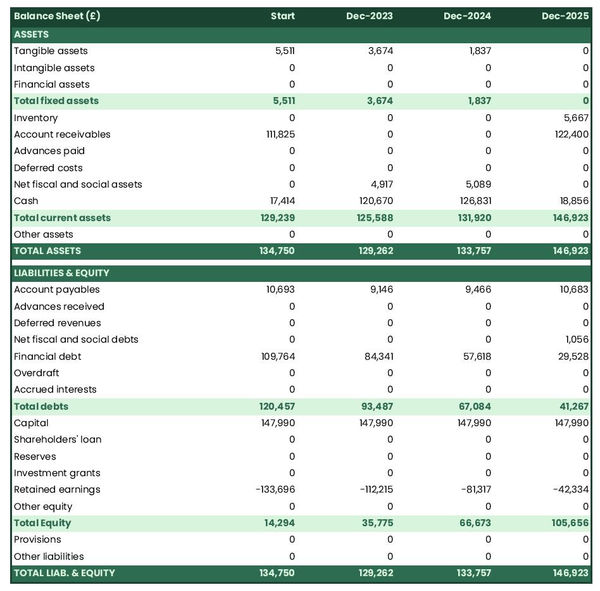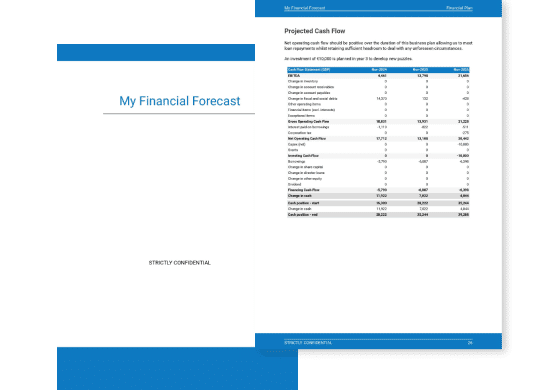How to create a financial forecast for a web hosting company?

Creating a financial forecast for your web hosting company, and ensuring it stays up to date, is the only way to maintain visibility on future cash flows.
This might sound complex, but with the right guidance and tools, creating an accurate financial forecast for your web hosting company is not that hard.
In this guide, we'll cover everything from the main goal of a financial projection, the data you need as input, to the tables that compose it, and the tools that can help you build a forecast efficiently.
Without further ado, let us begin!
Why create and maintain a financial forecast for a web hosting company?
Creating and maintaining an up-to-date financial forecast is the only way to steer the development of your web hosting company and ensure that it can be financially viable in the years to come.
A financial plan for a web hosting company enables you to look at your business in detail - from income to operating costs and investments - to evaluate its expected profitability and future cash flows.
This gives you the visibility needed to plan future investments and expansion with confidence.
And, when your trading environment gets tougher, having an up to date web hosting company forecast enables you to detect potential upcoming financing shortfalls in advance, enabling you to make adjustments or secure financing before you run out of cash.
It’s also important to remember that your web hosting company's financial forecast will be essential when looking for financing. You can be 100% certain that banks and investors will ask to see your numbers, so make sure they’re set out accurately and attractively.
Need a convincing business plan?
The Business Plan Shop makes it easy to create a financial forecast to assess the potential profitability of your projects, and write a business plan that’ll wow investors.

What information is used as input to build a web hosting company financial forecast?
A web hosting company's financial forecast is only as good as the inputs used to build it.
If you are creating (or updating) the forecast of an existing web hosting company, then you mostly need your accounting information, key historical operating non-financial data, and your team’s input on what to expect for the coming years.
If you are building financial projections for a web hosting company startup, you will need to have done your research and have a clear picture of your competitive environment and go-to-market strategy so that you can forecast sales accurately.
For a new venture, you will also need a precise list of the resources needed to keep the web hosting company running on a day-to-day basis and a list of the equipment and expenditures required to start the business (more on that later).
Let's now take a closer look at the elements that make up your web hosting company's financial forecast.
The sales forecast for a web hosting company
The sales forecast, also called topline projection, is normally where you will start when building your web hosting company financial forecast.
Creating a coherent sales projection boils down to estimating two key drivers:
- The average price
- The number of monthly transactions
To do this, you will need to rely on historical data (for an existing business), market research data (for both new and existing web hosting companies), and consider the elements below:
- Competition in the web hosting market (e.g. new players entering the market, existing competitors offering lower prices or better services)
- Technological advancements (e.g. new hardware or software that allows for faster and more efficient web hosting services)
- Economic conditions (e.g. a recession leading to reduced demand for web hosting services, or a booming economy driving up demand)
- Changes in consumer preferences (e.g. a shift towards cloud-based hosting or a preference for eco-friendly hosting options)
- Security threats and data breaches (e.g. a high-profile data breach in the industry leading to increased demand for secure hosting services)
After the sales forecast comes the operating expenses budget, which we will now look into in more detail.
Need a convincing business plan?
The Business Plan Shop makes it easy to create a financial forecast to assess the potential profitability of your projects, and write a business plan that’ll wow investors.

The operating expenses for a web hosting company
Once you know what level of sales you can expect, you can start budgeting the expenses required to operate your web hosting company on a daily basis.
Expenses normally vary based on how much revenue you anticipate (which is why, from experience, it is always better to start your forecast with the topline projection), and where your business is based.
Operating expenses for a web hosting company will include some of the following items:
- Staff costs: This includes salaries, bonuses, benefits, and training for your employees. As a web hosting company, you'll need to have a team of technical support staff, customer service representatives, and sales executives.
- Accountancy fees: You'll need to hire an accountant to help you with bookkeeping, tax preparation, and financial reporting. They can also provide advice on financial strategies and help you stay compliant with regulations.
- Insurance costs: As a web hosting company, you'll need to protect your business from potential risks such as cyber attacks, data breaches, and hardware failures. This may include general liability insurance, cyber liability insurance, and business interruption insurance.
- Software licences: You'll need to purchase licences for various software programs to run your business smoothly. This may include a billing system, server control panel, security software, and productivity tools.
- Banking fees: You'll need a business bank account to manage your finances and make transactions. This may include fees for wire transfers, credit card processing, and monthly account maintenance.
- Marketing expenses: To attract new customers and retain existing ones, you'll need to invest in marketing efforts such as advertising, email campaigns, social media, and search engine optimization.
- Utilities: Running a web hosting company requires a lot of electricity to power servers and other equipment. You'll also need to pay for internet, phone, and other utilities.
- Rent or mortgage: If you operate your business from a physical location, you'll need to pay rent or a mortgage for the space. You may also need to pay for maintenance and repairs.
- Professional services: You may need to hire outside help for tasks such as legal advice, web design, and content creation. These services can help improve your business operations and attract more customers.
- Hardware and equipment: As a web hosting company, you'll need to invest in servers, networking equipment, and other hardware to provide reliable services to your customers.
- Training and development: In order to stay competitive and up-to-date with the latest technologies, you'll need to invest in training and development for yourself and your employees.
- Office supplies: You'll need to purchase office supplies such as paper, ink, and toner to keep your business running smoothly.
- Travel expenses: If you attend conferences, trade shows, or other business events, you'll need to budget for travel expenses such as airfare, hotel accommodations, and meals.
- Telecommunications: In order to communicate with your customers and employees, you'll need to pay for phone and internet services.
- Maintenance and repairs: As a web hosting company, you'll need to regularly maintain and repair your servers and other equipment to ensure they are functioning properly.
This list will need to be tailored to the specificities of your web hosting company, but should offer a good starting point for your budget.
What investments are needed to start or grow a web hosting company?
Creating and expanding a web hosting company also requires investments which you need to factor into your financial forecast.
Capital expenditures and initial working capital items for a web hosting company could include elements such as:
- Servers: As a web hosting company, one of your main assets will be your servers. These are the computers that will store and deliver your clients' websites and files. You will need to purchase or lease servers, as well as any necessary networking equipment and infrastructure.
- Data Center Space: In order to house your servers, you will need to rent or purchase data center space. This is a specialized facility that provides the necessary power, cooling, and security for your servers to run efficiently and safely.
- Software Licenses: Web hosting companies often use software to manage and automate their services, such as control panels and billing systems. These software licenses can be a significant capital expenditure, but are necessary for the smooth operation of your business.
- Security Equipment: As a web hosting company, it is crucial to have robust security measures in place to protect your servers and your clients' data. This may include firewalls, intrusion detection systems, and other security equipment.
- Backup and Disaster Recovery Systems: To ensure business continuity and protect against data loss, you will need to invest in backup and disaster recovery systems. This can include backup servers, off-site storage, and redundant power and internet connections.
Again, this list is not exhaustive and will need to be adjusted according to the circumstances of your web hosting company.
Need a convincing business plan?
The Business Plan Shop makes it easy to create a financial forecast to assess the potential profitability of your projects, and write a business plan that’ll wow investors.

The financing plan of your web hosting company
The next step in the creation of your financial forecast for your web hosting company is to think about how you might finance your business.
You will have to assess how much capital will come from shareholders (equity) and how much can be secured through banks.
Bank loans will have to be modelled so that you can separate the interest expenses from the repayments of principal, and include all this data in your forecast.
Issuing share capital and obtaining a bank loan are two of the most common ways that entrepreneurs finance their businesses.
What tables compose the financial plan for a web hosting company?
Now let's have a look at the main output tables of your web hosting company's financial forecast.
The profit & loss forecast
The forecasted profit & loss statement will enable you to visualise your web hosting company's expected growth and profitability over the next three to five years.

A financially viable P&L statement for a web hosting company should normally show:
- Sales growing above inflation
- Stable or expanding (ideally) profit margins
- A net profit
This will of course depend on the stage of your business: a new venture might be loss-making until it reaches its breakeven point in year 2 or 3, for example.
The projected balance sheet
Your web hosting company's projected balance sheet provides a snapshot of your business’s financial position at year-end.
It is composed of three types of elements: assets, liabilities and equity:
- Assets: represent what the business possesses including cash, equipment, and accounts receivable (money owed by clients).
- Liabilities: represent funds advanced to the business by lenders and other creditors. They include accounts payable (money owed to suppliers), taxes payable and loans from banks and financial institutions.
- Equity: is the combination of what has been invested by the business owners and the cumulative profits and losses generated by the business to date (which are called retained earnings). Equity is a proxy for the value of the owner's stake in the business.

The cash flow forecast
Your web hosting company's cash flow forecast shows how much cash your business is expected to consume or generate in the years to come.

It is best practice to organise the cash flow forecast by nature to better explain where cash is used or generated by the web hosting company:
- Operating cash flow: shows how much cash is generated by the operating activities
- Investing cash flow: shows how much will be invested in capital expenditure to maintain or expand the business
- Financing cash flow: shows if the business is raising new capital or repaying financiers (debt repayment, dividends)
Keeping an eye on (and regularly updating) your web hosting company's cash flow forecast is key to ensuring that your business has sufficient liquidity to operate normally and to detect financing requirements as early as possible.
If you are trying to raise capital, you will normally be asked to provide a monthly cash flow forecast in your web hosting company's financial plan - so that banks or investors can assess seasonal variation and ensure your business is appropriately capitalised.
Need a convincing business plan?
The Business Plan Shop makes it easy to create a financial forecast to assess the potential profitability of your projects, and write a business plan that’ll wow investors.

Which tool should you use to create your web hosting company's financial forecast?
Creating your web hosting company's financial forecast may sound fairly daunting, but the good news is that there are several ways to go about it.
Using online financial forecasting software to build your web hosting company's projections
The modern and easiest way is to use an online financial forecasting tool such as the one we offer at The Business Plan Shop.
There are several advantages to using specialised software:
- You can easily create your financial forecast by letting the software take care of the financial calculations for you without errors
- You have access to complete financial forecast templates
- You get a complete financial forecast ready to be sent to your bank or investors
- You can easily track your actual financial performance against your financial forecast, and recalibrate your forecast as the year goes by
- You can create scenarios to stress test your forecast's main assumptions
- You can easily update your forecast as time goes by to maintain visibility on future cash flows
- You have a friendly support team on standby to assist you when you are stuck
- It’s cost-efficient and much cheaper than using an accountant or consultant (see below)
If you are interested in this type of solution, you can try our projection software for free by signing up here.
Calling in a financial consultant or chartered accountant
Enlisting the help of a consultant or accountant is also a good way to obtain a professional web hosting company financial forecast.
The downside of this solution is its cost. From experience, obtaining a simple financial forecast over three years (including a balance sheet, income statement, and cash flow statement) is likely to cost a minimum of £700 or $1,000.
The indicative cost above, is for a small business, and a forecast is done as a one-shot exercise. Using a consultant or accountant to track your actuals vs. forecast and to keep your financial projections up to date on a monthly or quarterly basis will cost a lot more.
If you opt for this solution, make sure your accountant has in-depth knowledge of your industry, so that they may challenge your figures and offer insights (as opposed to just taking your assumptions at face value to create the forecast).
Why not use a spreadsheet such as Excel or Google Sheets to build your web hosting company's financial forecast?
Creating an accurate and error-free web hosting company financial forecast on Excel (or any spreadsheet) is very technical and requires both a strong grasp of accounting principles and solid skills in financial modelling.
Most entrepreneurs lack the expertise required to create an accurate financial forecast using spreadsheet software like Excel or Google Sheets. As a result, it is unlikely anyone will trust your numbers.
The second reason is that it is inefficient. Building forecasts on spreadsheets was the only option in the 1990s and early 2000s, nowadays technology has advanced and software can do it much faster and much more accurately.
This is why professional forecasters all use software. With the rise of AI, software is also becoming smarter at helping us detect mistakes in our forecasts and helping us analyse the numbers to make better decisions.
Finally, like everything with spreadsheets, tracking actuals vs. forecasts and updating your forecast as the year progresses is manual, tedious, error-prone, and time-consuming. Whereas financial forecasting software like The Business Plan Shop is built for this.
Need a convincing business plan?
The Business Plan Shop makes it easy to create a financial forecast to assess the potential profitability of your projects, and write a business plan that’ll wow investors.

Use our financial projection templates for inspiration
The Business Plan Shop has dozens of financial forecasting templates available.
Our examples contain both the financial forecast, and a written business plan which presents, in detail, the company, the team, the strategy, and the medium-term objectives.
Whether you are just starting out or already have your own web hosting company, looking at our template is always a good way to get ideas on how to model financial items and what to write when creating a business plan to secure funding.

Takeaways
- A financial projection shows expected growth, profitability, and cash generation for your business over the next three to five years.
- Tracking actuals vs. forecast and keeping your financial forecast up-to-date is the only way to maintain visibility on future cash flows.
- Using financial forecasting software makes it easy to create and maintain up-to-date projections for your web hosting company.
You have reached the end of our guide. We hope you now have a better understanding of how to create a financial forecast for a web hosting company. Don't hesitate to contact our team if you have any questions or want to share your experience building forecasts!
Need a convincing business plan?
The Business Plan Shop makes it easy to create a financial forecast to assess the potential profitability of your projects, and write a business plan that’ll wow investors.

Also on The Business Plan Shop
- Example of financial projections
- How to create a turnover forecast for a business?
- Example of financial forecast for business idea
Know someone who runs or wants to start a web hosting company? Share our financial projection guide with them!




